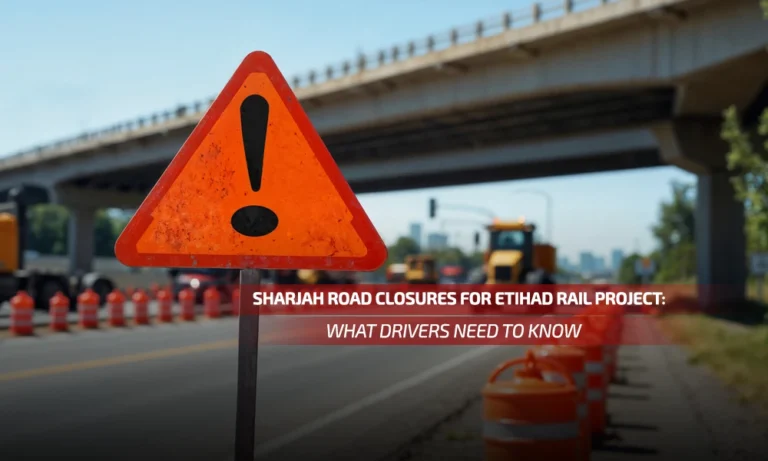What’s Closing, When & Why
From Tuesday, July 1 to Saturday, August 30, Sharjah Road & Transport Authority is shutting down key connecting roads between Mleiha Road and Sharjah Ring Road, right near University Bridge.
These Sharjah road closures are essential for the ongoing infrastructure development.
This closure is a crucial part of the Etihad rail project phase 2, which aims to build railway tracks across the UAE linking industries, ports, and airports.
Sharjah sits at a crucial junction, heading freight and passenger routes from Northern Emirates down to Dubai and Abu Dhabi.
Why it matters: That stretch is a commuter favourite—especially for students and airport staff. Expect slowdowns, detours, and longer daily drive times.
How It Impacts Your Commute
- Alternatives are longer & may add tolls: Reports say your commute could now take 1–2 hours more depending on route—expect additional Salik charges if you go via Dubai.
- Traffic rerouting in real time: SRTA recommends following official detour signage. They’ve added QR-code maps in some spots. Still, navigation apps will become your best ally.
- Peak hours = patience test: University students, airport workers, and school drop-offs will amplify congestion between 7–9 AM and 4–7 PM.
Understanding these Sharjah road closures is key to planning your daily travel efficiently and mitigating delays.
Also read: Affordable long range electric cars
Community Voices & Context
- A cycling student from AUS says her ride to campus is now “longer, slower and more irritating”.
- A medical student noted extra Salik bills (Dh500–600 extra monthly) and more time in traffic.
- But here’s the flip side: both are excited about the upcoming Sharjah passenger station near University City—seeing it as a fast, toll-free route .
Long-Term Gains & Project Gaps
- The completion of the Etihad rail project promises to drastically shorten travel time—Abu Dhabi to Dubai in 57 minutes, and the east coast within 105 minutes. This progress is largely due to the advancements made during Etihad Rail Phase 2
- Freight will shift off roads—cutting truck traffic, congestion, emissions, and enhancing road safety.
- Key developments within the Etihad rail project Phase 2 include a new Sharjah passenger station near University City and connections to industrial zones like SICD.
Things to keep in mind:
- No estimated delays mentioned: We’ve learned commuters could see 1–2 extra hours daily and Dh500–600 more monthly in tolls.
- Partial detour details only: Traffic sign QR codes were mentioned only by Khaleej Times—but missing in TOI’s report.
- Project timeline clarity: Phase 2 includes a new Sharjah passenger station near University City and connects industrial zones like SICD—but some coverage glossed over the 2026 passenger service launch target.
What You Should Do Now
- Plan alternative routes before your first commute on July 1—preferably in real-time navigation apps.
- Expect rerouting to include Salik. Add Dh500–600 to your monthly transport budget—until late August.
- Avoid peak hours where possible. Shifting your schedule by 30 minutes can save significant delay time.
- Follow official signs and QR-code maps for the latest Sharjah traffic update. They’re updated daily, and apps don’t always catch up fast
- Stay informed with a consistent Sharjah traffic update. Regular closures or phased openings might change through August
You may also like: How to deal with a broken down car
The More You Know The Better
Two months of closure is inconvenient—but it’s a strategic pause for a game-changing transport upgrade.
Yes, you’ll sit in traffic and shell out for extra tolls. But keep your eye on the end-game:
- Faster, greener commuting
- Less road congestion
- New passenger rail station at University City
- Infrastructure to support Sharjah’s economic growth
This is Sharjah saying: “We’re building something bigger—and you’re part of it.”
So, drive smart, recalibrate your route, and keep tuned for the August 30 reopening. Because a train might just be the fastest way home next year.
Check out our other blogs: Are EVs the answer to reliability in the hot weather of UAE?







